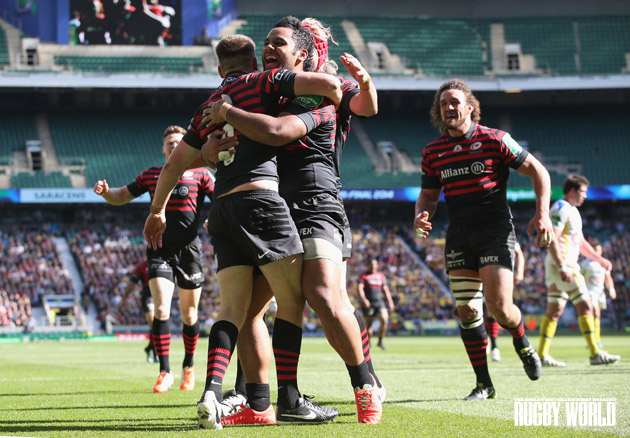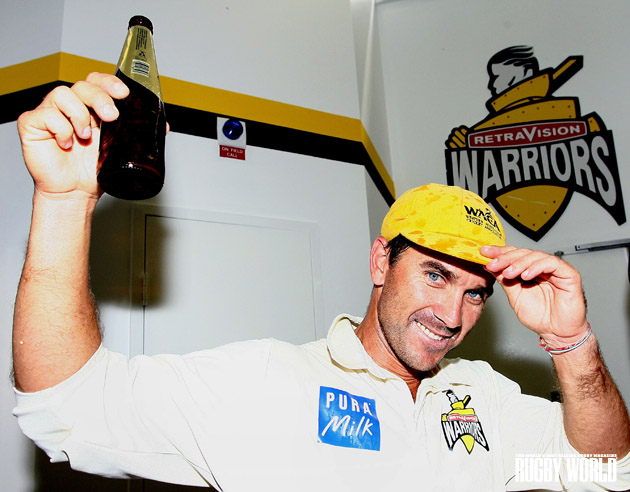“No one likes us. No one likes us. No one likes us. We don’t care.”
So goes the famous chant of Millwall Football Club’s fans who are, to put it politely, as a fairly spiky bunch.
Now, Saracens are nowhere near as divisive as The Den’s inhabitants. However, neither are they the most popular side in European rugby – neutrals are not overly heartbroken to see them fail. Because that doesn’t happen too often, sarcasm usually takes the place of schadenfreude.
The Premiership and Heineken Cup finalists are singled out for a number of reasons. Their prominent Southern African contingent, allegations of salary cap tinkering, shouty Allianz Park entertainment and some unconventional marketing ideas have all attracted flak at different times. Failing that, as this weekend demonstrated, Chris Ashton could probably wind up his own shadow.
Snide criticism reached a cacophony during their muscular dismantling of Clermont at the end of last month. With Twickenham barely a quarter-full, Saracens’ fan base became an easy target for jealous barbs.
Out on the field, Mark McCall’s side were indifferent to any mockery and set about delivering one of the great defensive performances – a masterpiece of destructive tackling that obliterated the Top 14 giants and brought a 46-6 triumph, setting up Saturday’s date with Toulon at Cardiff’s Millennium Stadium.
It was a result forged from a rock-solid foundation of companionship. Team culture is a concept spoken about a great deal these days, but Saracens make it so tangible.
The process can be traced back to the autumn of 2009, when Justin Langer – Australian former cricketer and a friend of club owner Nigel Wray – held an audience on the subject of unity and brotherhood. As the conductor of ‘Under the Southern Cross’ whenever a Test was won (far more often than not over 105 matches in the baggy green), he recommended Saracens adopt a victory song. Sometimes, he explained, you dig deeper when a game is in the balance simply because you are so desperate to belt out a familiar tune with your mates.
Remember when Northampton were beaten 28-27 later that season and Dylan Hartley got riled at the noises coming from the Franklin’s Gardens away dressing room? Langer was probably very proud of himself when that story broke. You can picture the impish grin.
Saracens’ song is now a well-worn tradition and has contributed to a genuine closeness, alongside less conventional touches such as in-season trips to New York that encourage old-school unwinding. “Treat them unbelievably well,” Griffiths told the BBC last month, outlining a refreshing mantra. “They’ll work unbelievably hard.”
On the field, a Southern African influence is undeniable – Schalk Brits, Alistair Hargreaves, Jacques Burger and Neil de Kock form the formidable nucleus of a phenomenally strong squad of which only 55 per cent of players qualify for England. That is the third worst ratio in the Premiership behind relegated Worcester and London Irish. But dwelling on that would be to ignore how Saracens are developing very impressive players from these shores.
Of course, there are the bulldozing Vunipola brothers. Alex Goode is a wonderfully intelligent footballer with 107 Premiership appearances under his belt at the age of 26. Owen Farrell has found another dimension in attack, directing this year’s more expansive game-plan.
Then you scratch the surface. Jamie George has benefitted from Brits’ tutelage and could feature in New Zealand this summer given England’s shortage at hooker. Jackson Wray is a bruising, try-scoring back-rower and scrum-half Ben Spencer possesses a special spark about him. Athletic lock Maro Itoje is among the best teenagers on the planet too. Watch the Junior World Championship if you think that might be an exaggeration.
The remarkable Henry Fraser, younger brother of burgeoning openside flanker Will (another certain to represent England if he can stay fit), is living embodiment of Saracens’ collective culture. In 2009 while on holiday in Portugal, a diving accident left him paralysed from the neck down. The prospect of a promising rugby career – he was a centre-cum-flanker on Saracens’ Academy – was snatched away in an instant.
Thankfully, a ferocious competitive edge remained. After a series of operations and months in hospital, Henry is now an eloquent, affable ambassador for the Matt Hampson Foundation and a budding sportswriter who exudes life-affirming positivity. He was also a secret weapon for the Clermont game.
Asked to speak to the players prior to that contest, he was initially apprehensive – “I never thought anything I had to say would mean something to other people” – but gave a stunningly honest rendition of his own story that spared no niceties. As Henry finished, the room fell silent for a second or two before erupting into applause. The speaker was touched.
“Saracens has become a huge part of my life,” he explains. “Steve Borthwick came to visit me in hospital shortly after my accident when he was England captain and the club has been amazing ever since. His visit set the tone for what would be continuous support.
“The players have been unbelievable in their willingness to help whenever they have been asked, I couldn’t have asked for more. They really are a great group of guys. They made me very welcome before I spoke to them, which helped massively.
“The club means a great deal to me and they deserve all the success they have had so far this season,” Henry adds, before pausing and ending with a dash of his wicked humour. “If I could cross my fingers for more success, I would!”
Most striking about Henry’s take on Saracens is his sense of pride and belonging. Everybody associated with the club shares that steadfast feeling of ownership, which amounts to a rock-solid network that simply doesn’t care about outside detractors. Toulon must break that down to win in Cardiff. Even for an outfit rammed with stellar names, it won’t be easy.







